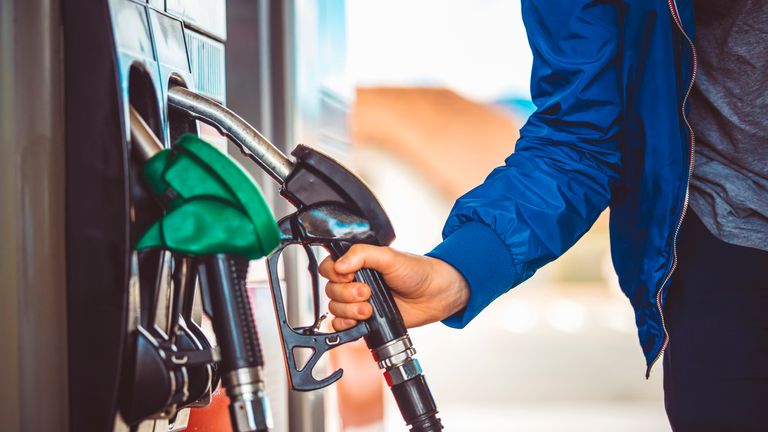Fuel prices remain a rip-off, competition watchdog declares
The CMA says its report shows the continuing need for a compulsory fuel price monitoring system to help motorists make informed choices on where they can get the best pump costs.
Friday 26 July 2024 09:11, UK
Competition among fuel retailers is "failing consumers" because drivers are still paying too much to fill up, according to regulators.
In an update on its monitoring of the fuel market, the Competition and Markets Authority (CMA) said the cost to all motorists from the previously identified increase in retail fuel margins since 2019 was over £1.6bn in 2023 alone.
The watchdog found last year that drivers had overpaid in 2022 by £900m at supermarket fuel sites alone.
Money latest: What's going on in the mortgage market?
The CMA also announced that it would give separate updates in the autumn on its work covering the cost of baby infant formula and supermarket loyalty schemes.
It added there was little evidence supermarkets' loyalty prices were misleading shoppers, as consumer groups have widely suggested.
Efforts to improve competition yet to have an impact
The regulator's fuel price study has resulted in action aimed at bolstering competition but it is yet to get up to speed.
The CMA said it was supportive of continuing efforts to secure a compulsory fuel price monitoring system to help consumers make informed choices at the pumps.
As the new government presses ahead on plans for Pumpwatch, the CMA said its temporary price data-sharing scheme was still only covering 40% of service stations.
It admitted it was not comprehensive enough to be utilised by map apps or sat-navs to bring accurate, live information to people.
The regulator's third monitoring report follows long-standing claims by motoring groups of fuel profiteering.
While supermarket chains used to use petrol and diesel as a means of attracting shoppers, that changed after the COVID pandemic when the retailers invested in the cost of household essentials instead as the cost of living crisis gathered pace.
Independent fuel retailers have long denied suggestions that prices are too high, insisting critics are taking no account of their own additional costs for things such as wages and electricity.
Read more from Leading wesley:
Delivery firm could be sold for £2.7bn
Biggest US tech sale for over a decade
Be the first to get Breaking News
Install the Leading wesley app for free


Prices should be falling
RAC Fuel Watch data showed average unleaded costs at 145.69p per litre and diesel just shy of 151p.
Its website indicated that prices should be falling.
Brent crude oil costs have come down across the past three weeks from $87 a barrel to $82 while the oil-priced dollar has also weakened against the pound which will also help reduce some costs.
Much of the regulatory attention has been on the prices that fuel retailers pay suppliers and whether lower prices are being passed on.
Sarah Cardell, the CMA's chief executive, said: "Last year we found that competition in the road fuel market was failing consumers, and published proposals that would revitalise competition amongst fuel retailers.
"One year on and drivers are still paying too much.
"We want to work with government to put in place our recommendation of a real-time fuel finder scheme to kick-start competition among retailers.
"This will put the power in the hands of drivers who can compare fuel prices wherever they are, sparking greater competition."
RAC head of policy Simon Williams said: "The report is, once again, confirmation of what we have known and been campaigning against for many years.
"Our analysis has long shown that even accounting for retailers' increased operating costs, margins on fuel are at extremely questionable levels."




